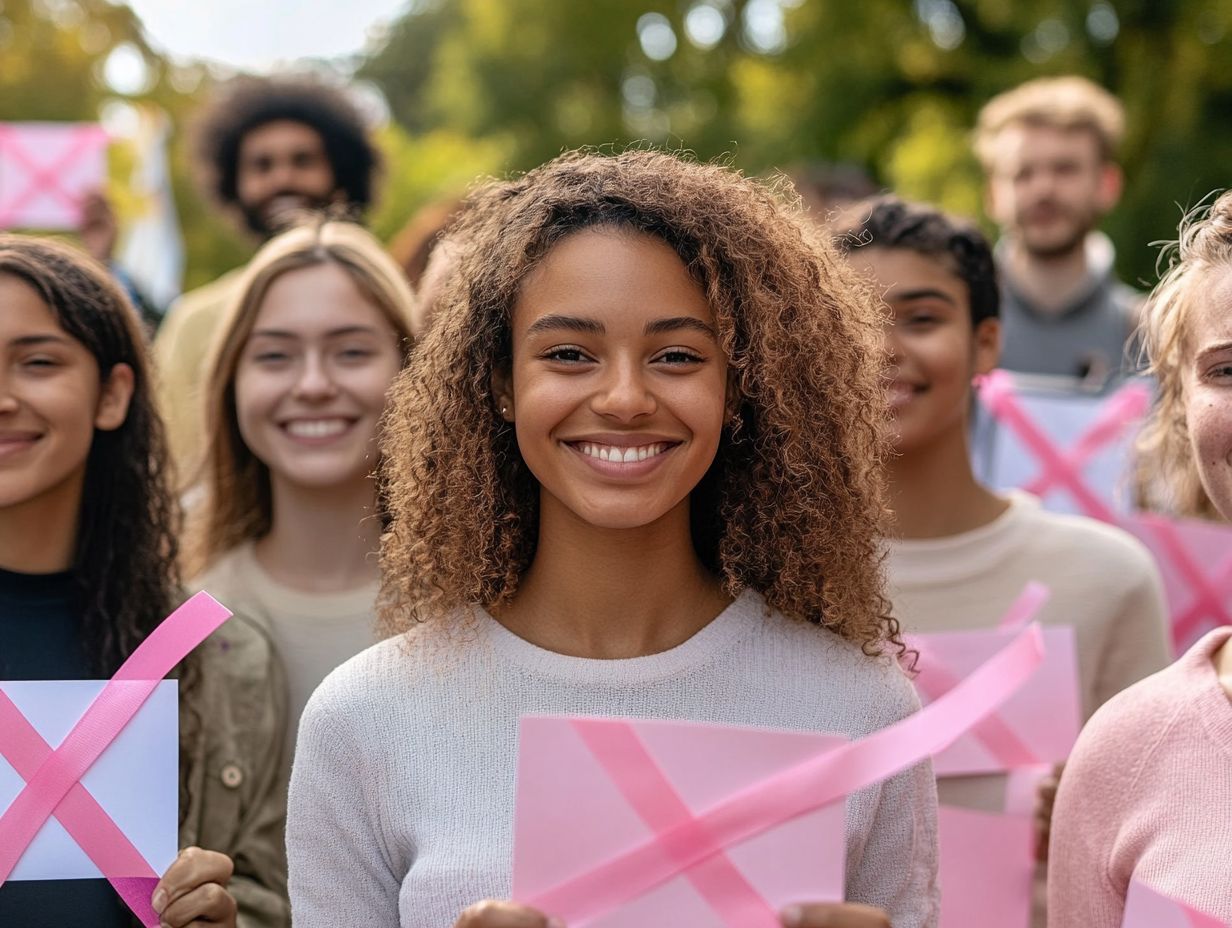Raising awareness about cancer is a powerful way to promote prevention, early detection, and support for those affected by this disease. Cancer, characterized by the uncontrolled growth of abnormal cells, has a profound impact on individuals and communities, with common types like breast, lung, colorectal, and pediatric cancer.
Awareness initiatives play a crucial role in educating the public on risk factors, driving funding for research, and inspiring legislative and healthcare advancements. Organizing community events, participating in fundraising activities, supporting educational workshops, and providing medical advice are effective methods to increase awareness.
Individuals and communities can make a significant difference by collaborating with organizations like the American Cancer Society, Blood Cancer UK, and Jo’s Cervical Cancer Trust, and participating in events such as Relay for Life and Race For Life. These collective efforts are vital in the fight against cancer, providing critical resources and emotional support for patients and survivors.
Key Takeaways:
Understanding Cancer and Health

Cancer is a group of diseases characterized by the uncontrolled growth and spread of abnormal cells within the body.
Understanding cancer involves recognizing its symptoms, causes, and treatment options to improve early detection and outcomes.
Organizations like Macmillan, Perci Health, and the American Cancer Society provide resources for cancer education and support.
Overview of Cancer, Its Symptoms, and Its Impact
Cancer is a disease characterized by uncontrolled cell growth that leads to various symptoms and health complications.
Cancer impacts individuals through symptoms like fatigue, weight loss, and pain, with diagnosis often requiring screenings and biopsies.
Common types include:
- prostate cancer
Each type needs specific diagnostic tests and treatment strategies, often involving healthcare providers and insurance considerations.
Early detection of cancer through regular screening improves prognosis and treatment outcomes.
Why Raising Awareness is Important
Raising awareness about cancer is important because it promotes prevention, early detection, and support for affected patients. It also emphasizes the importance of healthy practices, nutrition, and physical activity in reducing risk factors.
Awareness campaigns educate the public about cancer risk factors like smoking, alcohol consumption, and unhealthy diets.
Fundraising and community initiatives enhance resources for cancer research and treatment, providing vital support for patients. Additionally, advocacy and statistics play a crucial role in shaping policy and funding decisions.
The Power of Awareness in Fighting Cancer
The power of awareness in fighting cancer lies in educating individuals about risk factors and prevention strategies.
Awareness campaigns drive funding for research and innovative treatments.
Increased awareness leads to legislative changes, better healthcare funding, and improved detection and treatment outcomes.
Ways to Raise Awareness and Support

Ways to raise cancer awareness include organizing community events, hosting educational workshops, and launching volunteer initiatives.
Local organizations, charities like Blood Cancer UK and Solving Kids’ Cancer, and healthcare providers can collaborate to promote cancer prevention and patient support.
Individual Actions, Community Efforts, and Workplace Culture
Individual actions and community efforts are vital in raising cancer awareness and supporting health initiatives.
Individuals support cancer research and programs by participating in fundraising events like marathons and bake sales.
Volunteering with organizations such as Solving Kids’ Cancer provides direct assistance to affected families.
Community discussions spread knowledge and create a supportive environment for those impacted by cancer.
Collaboration amplifies impact, uniting efforts to drive change and advance the fight against cancer.
Supporting Cancer Patients and Survivors
Supporting cancer patients and survivors involves providing emotional support, practical assistance, and access to healthcare resources.
Organizations like St. Jude, Macmillan, and Comprehensive Cancer Centers support cancer patients by offering information on treatment options and access to healthcare.
Support for cancer survivors includes community initiatives that promote physical activity, mental wellbeing, and communication with reliable sources of medical advice.
How to Show Support and Make a Difference
Support cancer patients by participating in awareness events, volunteering at cancer organizations, and advocating for healthcare policy changes.
Raise funds and community spirit through charity walks or runs.
Offer emotional support by engaging in supportive conversations or acts of kindness.
Advocacy efforts focus on improving healthcare access and funding for research.
Resources for Cancer Awareness and Support

Resources for cancer awareness include nonprofit organizations, informational websites, and support groups.
Major organizations like the American Cancer Society (ACS) and NHS provide educational materials, support services, and funding for cancer research.
Informational websites such as Cancer.gov offer comprehensive details on different types of cancer, treatment options, and prevention methods.
Support groups like CancerCare provide emotional support and counseling for cancer patients and their families.
Organizations, Events, Campaigns, and Advocates
Organizations like the American Cancer Society, Breast Cancer Now, and Movember lead initiatives to combat cancer through awareness events and fundraising campaigns.
Events such as the American Cancer Society’s Relay for Life and campaigns like Breast Cancer Now’s ‘Wear it Pink’ unite communities, raise awareness, and fund cancer research.
These efforts highlight early detection and education while fostering community support for those affected by cancer. Advocates play a significant role in driving these initiatives forward.
Frequently Asked Questions about Cancer Awareness and Support
1. How can I help raise awareness about cancer?
There are numerous ways you can help raise awareness about cancer, such as participating in charity events, sharing educational resources on social media, and talking to friends and family about early detection and prevention methods.
2. Can I make a difference in the fight against cancer?

Absolutely! Every action, big or small, can have a positive impact in raising awareness about cancer. Whether you volunteer at a local cancer center, participate in fundraising campaigns, or simply wear a cancer awareness ribbon, you are making a difference.
3. What are some creative ways to raise awareness about cancer?
You can get creative with your efforts by organizing fundraising events, creating educational videos or blogs, or even shaving your head to show support for cancer patients. Use your talents and interests to spread awareness in a unique and meaningful way.
4. How can I involve my community and workplace in raising cancer awareness?
One great way to involve your community is by organizing a cancer awareness walk or run. You can also partner with local businesses to host a fundraiser or offer free educational workshops on cancer prevention, early detection, and healthy workplace practices.
5. What role does education and communication play in raising awareness about cancer?
Education is crucial in raising awareness about cancer. By educating yourself and others about the signs and symptoms of different types of cancer, as well as the importance of early detection and healthy lifestyle choices, you can help save lives. Effective communication of these messages is key to widespread impact.
6. Can I help raise awareness about cancer if I am currently battling the disease, including pediatric cancer?
Absolutely. Your personal experience with cancer can be a powerful tool in raising awareness and inspiring others to take action. You can share your story, offer support and resources to others, and participate in awareness events even while undergoing treatment, including those focused on pediatric cancer.





